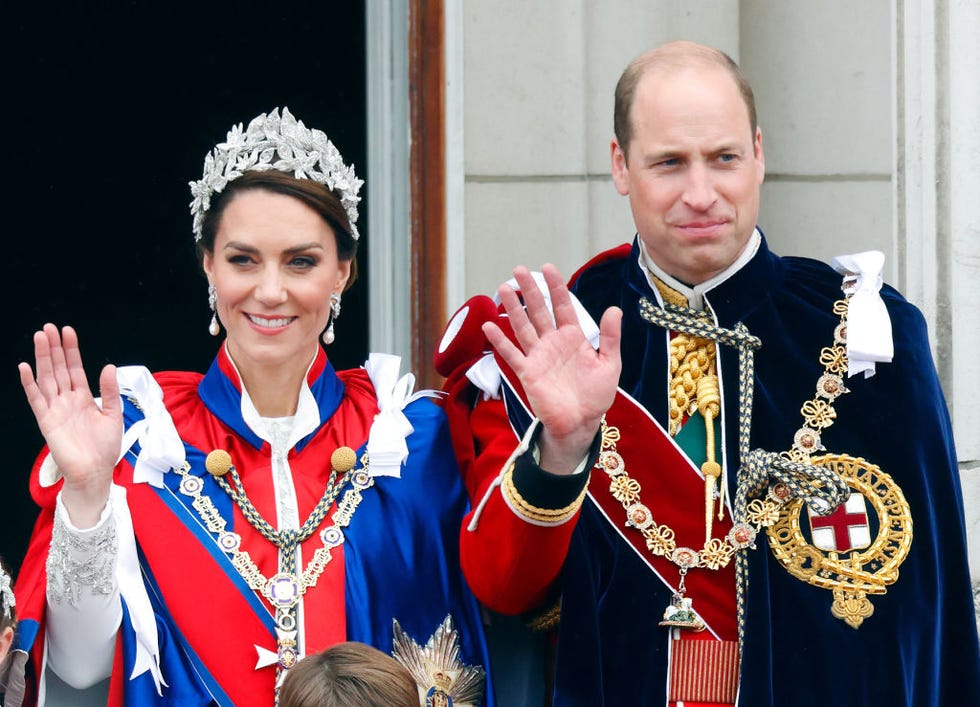Though it’s impossible to know when Prince William—and, as his queen consort, Princess Kate—will take the throne, Harper’s Bazaar shared exclusively that it is anticipated that day will come “earlier than expected” and “sooner rather than later.”
Whenever the time comes, a monarchy under King William and Queen Catherine “will look much less formal, less stiff than it has been under [King] Charles,” royal author Tom Quinn tells Bazaar. “What we can expect to see when William and Kate take the throne is a much more emotionally engaged couple. And it’s partly because I think they want to be a king and queen who are seen to engage much more with ordinary people in a very relaxed way.”
With King Charles III, Quinn adds, “the emphasis has been on ceremony, on dignity, all that kind of old-fashioned stuff. And William and Kate, I think, won’t be doing that. They’ll be doing the opposite.”
When the monarchy changes hands from Charles to William, the central constitutional role of the monarchy won’t change, royal biographer Robert Hardman says, “Just as it hasn’t changed with King Charles.”
As to William’s coronation someday, Hardman adds that it “will be a very different affair” than Charles’s, which took place on May 6, 2023, about eight months into his reign. “It’ll be less ceremony. It’ll be shorter. I think he’ll try to—I wouldn’t say modernize, but maybe some of the elements will feel more contemporary.”
Hardman predicts William’s future reign will be “very practical” and will represent “a natural modernization.” But, the author of the 2024 biography Charles III: New King. New Court. The Inside Story adds, “these things you kind of learn as you go along. One thing we have learned from King Charles is that if you predict that someone is going to be the same as king as they were when they were younger, forget it. King Charles is a very different creature to Prince Charles.”
William is, naturally, more casual than his father, says Ingrid Seward, editor-in-chief of Majesty magazine and author of 2024’s My Mother and I, about Charles’s relationship with his mother, the late Queen Elizabeth II. Seward agrees William’s future coronation will be smaller than Charles’s, much like Charles’s was significantly smaller than his mother’s before him. However, Seward cautions, “There is a limit to how small you can make these ceremonies. If you make them too small, then they’re pointless.”
William will be focused on making the monarchy appealing for the next generation, Hardman says, not the least of which are the three members of the next generation under his roof: Prince George, 11, Princess Charlotte, 9, and Prince Louis, 6.
As the Wales family of five currently enjoy the kids’ Easter break, “I think the feeling is to let them be children—young children, if you like—as long as they can be,” Seward says. Of George—who too, like his father William, is the heir to the throne—William and Kate “don’t want to have this weight on his shoulders—on his very young shoulders—that he might be King one day,” Seward says. “I mean, it’s a long time in the future.”
Spending time raising good kids is actually, in a way, future-proofing the monarchy, says royal biographer Sally Bedell Smith, author of Prince Charles: The Passions and Paradoxes of an Improbable Life.
“William and Catherine are really aware of the need to be with their children, to be as a family,” she tells Bazaar. “And actually, it’s part of their responsibilities as the Prince and Princess of Wales—George is going to be part of his [William’s] legacy, and they want to make sure they’re bringing him up in a way that gives him a normal childhood, but also helps to prepare him for what he will face.”
While William’s accession to the throne is certainly in the much closer future than George’s, the Prince and Princess of Wales are intentionally setting up their lives by putting their children first.
“They know that one of the good reasons for spending more time with the children and prioritizing them is that they won’t be able to do that when the time comes for William to be king, simply because in order to justify the existence of the royal family, the heaviest burden always rests on the king or the queen,” says Quinn, who wrote a definitive book on raising royal kids, 2023’s Gilded Youth: A History of Growing Up in the Royal Family. “William knows that, and William is fully committed to that. So they’re spending more time now while the heavy burden isn’t with them.”

















